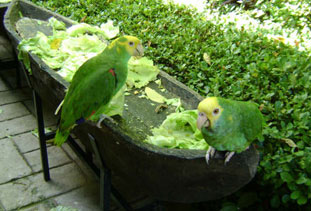
|  |  |  Editorials | Environmental | July 2008 Editorials | Environmental | July 2008  
Profepa Confiscates 360 Protected Wild Animals
 Presidencia de la República Presidencia de la República
go to original


| | Specimens included parrots, crocodiles, turtles and monkeys. | | |
Durango, Chiapas - Inspectors from the Federal Environmental Protection Department (Profepa) in Durango and Chiapas managed to rescue a total of wild animals destined to be illegally commercialized by eight persons delivered to the Federal State Prosecutor's Office.

In Durango, a vehicle check by Federal Preventive Police (PFP) revealed a total of 313 birds being transported to Ciudad Juárez, Chiahuahua, where the seven occupants of the vehicle were planning to sell them. The birds were from Nayarit, as were their captors, who failed to provide proof of legal ownership.

During two inspection operations in Palenque, Chiapas, personnel from the Federal Environmental Protection Delegation (Profepa) in Chiapas rescued 47 wild animals, which their owners had planned to sell, without providing proof of their legal possession or origin.

The animals included two howler monkeys (Alouatta pigra), three yellow-headed parrots (Amazona oratrix), 4 crocodiles (Crocodylus moreletii), 1 crocodile turtle (Chelydra serpentine), 21 Herrara’s mud turtles (Kinosternon herreria), 4 furrowed wood turtles (Rhinoclemmys areolata), 4 red turtles (Rhinoclemmys pulcherrima) and 7 Mexican musk turtles (Staurotypus salvini), all of which are under some form of protection.

Following a citizen’s call on money trafficking and commercialization, with the collaboration of Mexican Army and Preventive Federal Police officers, stationed in Palenque, Chiapas, an operation was carried out in a place called Bajadas Grandes,in the municipality of Playas de Catazajá, where a person in possession of a howler monkey was arrested.

The monkey’s captor was immediately handed over to a Federal Public Prosecutor's Office agent in Palenque, Chiapas, since, according to Article 60-2, of the General Wildlife law, no primates may be caught either for subsistence or commercial uses.

According to NOM-059-SEMARNTA-2001, the captured specimens belonged to one of the categories of protected species which are either endangered, enjoy some form of special status or are simply threatened. According to Article 420 of the Penal Code, those who capture, possess, transport or hoard any of these species, their products or by-products will be punished by one to nine years of prison and fines ranging from 300 to 3000 days in prison.

Source: Media and Communications Department. Information Department. Federal Environmental Protection Office (Profepa) |

 |
|  |



